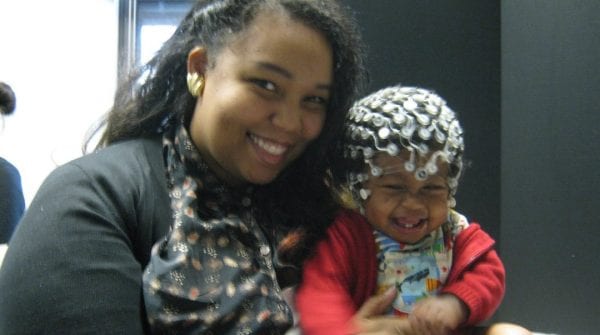 An innovative collaboration between neuroscientists and developmental psychologists that investigated how infants’ brains process other people’s action provides the first evidence that directly links neural responses from the motor system to overt social behavior in infants.
An innovative collaboration between neuroscientists and developmental psychologists that investigated how infants’ brains process other people’s action provides the first evidence that directly links neural responses from the motor system to overt social behavior in infants.
The research will be published April 12 in Psychological Science, the peer-reviewed journal of the Association for Psychological Science.
The study involved thirty-six 7-month-old infants, who were each tested while wearing a cap that used electroencephalography (EEG) to measure brain activity. During the experiment, each infant observed an actor reach for one of two toys. Immediately after, the baby was allowed to select one of the same toys. This procedure was repeated 12 times.
Babies’ brain activity predicted how they would respond to the actor’s behavior. When the infants recruited their motor system while observing the actor grasp one of the toys, they subsequently imitated the actor. When they didn’t imitate the actor, there was no detectable engagement of the motor system in their brain activity as they watched the actor.
“Our research provides initial evidence that motor system recruitment is contingently linked to infants’ social interactive behavior,” said lead author Courtney Filippi, a doctoral candidate in developmental psychology at the University of Chicago. “It provides initial evidence that recruiting the motor system during action encoding predicts infants’ subsequent social interactive behavior.”
– See more at: http://www.eurekalert.org/pub_releases/2016-04/uoc-nfr041116.php